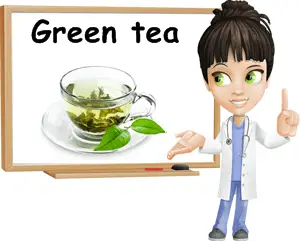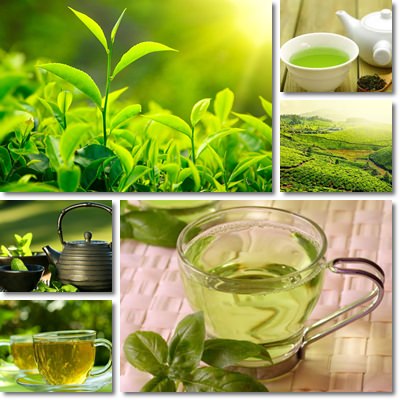Camellia sinensis is a species of small tree whose leaves are used to make the popular green tea beverage. Leaves are harvested and then processed to various extents in order to obtain several tea varieties, the most noteworthy being black, white, yellow and green tea.
There is great controversy surrounding green tea consumption because despite its many health benefits, there are also proven side effects to the herbal infusion.
While there are proven health benefits to regular consumption of green tea infusions, the same properties of the brew that engender some of its healing effects may also have a negative action on our health, especially in cases of excessive consumption.
Regular consumption can thus boost metabolism, energize and protect against oxidative stress, but can also be excessively stimulating on the nervous and cardiovascular systems, potentially causing insomnia or palpitations.

Palpitations, tremors or extrasystoles go hand in hand with the energizing effects of the herbal infusion, while a fast metabolism and weight loss are shadowed by side effects such as insomnia, dizziness, restlessness, irregular heartbeat or diarrhea and constipation.
At the same time, although it exhibits anticancer properties, the magical brew may cause severe allergic reactions in individuals particularly sensitive to it or digestive problems. And the list can go on.
As is the case with herbs in general, caution is in order as there is often little research on their long term effects or interactions with various medicines.
However, moderate consumption of green tea has been found to be highly beneficial for human health. Most of the health benefits of the brew stem from its antioxidant content.
According to research, green tea has the highest antioxidant content of all Camellia sinensis varieties, in part because it is a less processed variety – compared to black tea which is the most processed.

According to a study entitled Tea and health: studies in humans, catechins and theaflavins are the two main bioactive polyphenols in green tea and are allegedly responsible for the majority of its health benefits, including the anticancer activity.
The catechin Epigallocatechin-3-O-gallate has been found to improve the effects of conventional anticancer medicines and even show more potent effects, according to the Institute of Bioengineering and Nanotechnology, Singapore, and Beth Israel Deaconess Medical Center and Harvard Medical School in the US.
Other studies show that active compounds in green tea help reduce free radical damage and protect cells and DNA against potentially cancerous mutations and, at the same time, inhibit tumor cell proliferation.
Moreover, as a result of its caffeine content, green tea boosts energy levels and increases alertness. It has also been shown to improve metabolism and contribute to weight loss, hence its popularity. However, because it tastes bitter, some people choose not to drink it at all and opt for other herbal teas that taste better, less bitter.
While plenty of better-tasting herbs for tea boast excellent health benefits too, green tea exhibits important curative properties despite its bad taste.
What are the benefits of Green Tea?
Here is a list of the top 14 health benefits green tea promises to bring:
1) Offers anticancer protection (scientifically proven anticancer properties).
2) Increases stamina and alertness.
3) Contributes to preventing atherosclerosis.
4) Helps lower blood cholesterol levels.
5) Promotes weight loss.
6) Potential use in treating rheumatoid arthritis.
7) Lowers Alzheimer’s and Parkinson’s risks.
8) Offers antibacterial protection.
9) Lowers infection risks.
10) Contributes to better dental hygiene and may reduce cavity risks.
11) Offers antioxidant protection and is believed to prevent premature aging signs.
12) Increases hydration.
13) May contribute to acne prevention.
14) Reduces thrombosis, atherosclerosis and stroke risks.
Possible side effects of Green Tea
A moderate consumption of the popular brew can provide all of these health benefits and many more. However, each and every one of us is different and may react differently to various foods and herbs.
What is good for me may not be so good for you. The same goes for green tea.
Some people are naturally full of energy and alert and drinking green tea may lead to increasing stamina up to the point that it may cause palpitations, arrhythmia or other cardiovascular manifestations of the sort.
Similarly, green tea may upset people with stomach problems such as gastritis or gastric ulcers or trigger constipation, especially if drank on an empty stomach.
While it can be good for the brain, in addition to the heart, drinking too much green tea can cause insomnia and other sleep problems, magnify anxiety symptoms, cause tremors, dizziness, ringing ears or confusion.
Moreover, green tea can interact with certain medication, especially anticoagulants and can trigger nutritional deficiencies as a result of its caffeine content.
Other potential side effects of the herb include headaches, heartburn, acid reflux and nausea. Last but not least, particularly sensitive individuals may be allergic to the brew and can experience severe allergic reactions following consumption. If you know you are allergic, avoid green tea and other Camelia sinensis products in all forms and preparations.
Conclusion
Overall, green tea boasts almost as many side effects as it does health benefits for some people. Although consumption is highly recommended, mostly because of its impressive anticancer properties, green tea is not for everyone. If you experience more side effects than benefits following consumption, then you might want to consider replacing it with other, safer and just as beneficial herbs.
